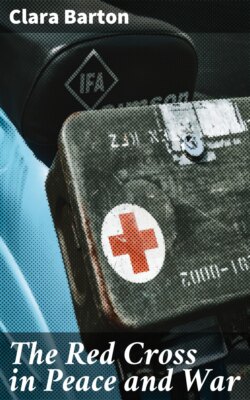Читать книгу The Red Cross in Peace and War - Barton Clara - Страница 8
На сайте Литреса книга снята с продажи.
OCCUPATIONS OF RELIEF SOCIETIES IN TIMES OF PEACE.
ОглавлениеTable of Contents
Organization, recognition and communication are by no means all that is necessary to insure the fulfillment of the objects of these associations. A thing most important to be borne in mind is that if money be necessary for war, it is also an indispensable agent in relief of the miseries occasioned by war. Self-devotion alone will not answer. The relief societies need funds and other resources to carry on their work. They not only require means for current expenses, but, most of all, for possible emergencies. To obtain and prudently conserve these resources is an important work. The Russian Society set a good example of activity in this direction. From the beginning of its organization in 1867 it systematically collected money over the whole empire and neglected nothing that tended to success. It put boxes in churches, convents, armories, railroad depots, steamboats, in every place frequented by the public. Beside the collection of funds, the Conference of 1863 recommended that peace periods should be occupied in gathering necessary material for service. In 1868 there were in Geneva alone five depots where were accumulated one thousand two hundred and twenty-eight shirts, besides hosiery, bandages, lint, etc., for over one thousand wounded. There were also large collections in the provinces, and now, thirty years later, these accumulations have probably greatly increased. In other countries the supplies remaining after wars were gathered in depots and were added to abundantly. Thus, in 1868, the Berlin Committee was in possession of supplies worth over twenty-five thousand dollars. Especial care is taken to acquire familiarity with the use of all sanitary material, to eliminate as far as possible whatever may be prejudicial to sick or wounded men, to improve both sanitary system and all supplies to be used under it, to have everything of the very best, as surgical instruments, medicine chests, bandages, stretchers, wagons, tents and field hospitals.
We would refer to the effort made in the national exhibitions of the various countries, where the societies of the Red Cross have displayed their practical improvements and inventions in competitive fields, taxing to the utmost human ingenuity and skill. Some countries have taken grand prizes. An exposition at The Hague was held in 1867 exclusively for the work of the Red Cross. Permanent museums have been established where all sorts of sanitary material for relief are exhibited, as may be seen in Stockholm, Carlsruhe, St. Petersburg, Moscow and Paris. The museum of Paris is the most important of all, and is international, other countries having participated in its foundation. Another method is the publication of works bearing upon this subject, some of which are scientific and very valuable. Not less important is the sanitary personnel. Of all aid, efficient nurses are the most difficult to obtain. There are numbers of men and women who have the will and devotion necessary to lead them into hospitals or to battlefields, but very few of them are capable of performing well the duties of nurses. Therefore, but a small portion of the volunteers are available. The relief societies soon found that women were by nature much better fitted for this duty than men can be, and to enable them to fulfill to the best advantage the mission for which they are so well adapted, it was decided to afford them the best possible professional instruction. For this purpose, during peace training schools were established from which were graduated great numbers of women who are ready at a moment’s notice to go upon the battlefield or into hospitals. These professional nurses find no difficulty during times of peace in securing remunerative employment. Indeed, they are eagerly sought for by the community to take positions at the bedside of the sick, with the proviso that they are to be allowed to obey the pledge of their society at the first tocsin of war. There are schools for this purpose in England, Germany, Sweden, Holland, Russia and other European countries, and nothing has been neglected to make them thorough and to place them on a strong and solid basis.
